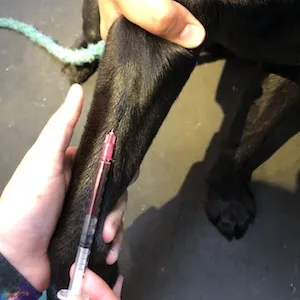Heartworm disease is a serious and potentially fatal condition affecting dogs in the United States and many other parts of the world. It’s caused by worms that reside in the heart, lungs, and associated blood vessels, leading to severe lung disease, heart failure, and damage to other organs. While prevention is key, recognizing the signs of a dog having lyme disease succumbing to heartworms can help you seek timely veterinary care and provide comfort to your beloved companion.
Understanding Heartworm Disease
Heartworm disease primarily affects dogs, cats, and ferrets. Dogs are natural hosts for heartworms, meaning the worms mature, mate, and produce offspring within them. Without treatment, a dog can harbor hundreds of worms, causing lasting damage to the heart, lungs, and arteries.
Mosquitoes play a crucial role in transmitting heartworm disease. When a mosquito bites an infected animal, it picks up microscopic baby worms called microfilariae. These microfilariae develop into infective larvae within the mosquito. When the infected mosquito bites another susceptible animal, the larvae enter the new host and mature into adult heartworms over approximately 6 months. Adult heartworms can live for 5 to 7 years in dogs.
Early Signs of Heartworm Disease
In the early stages, many dogs show few or no symptoms. However, as the infection progresses, symptoms become more apparent. Active dogs, those heavily infected, or those with other health issues are more likely to exhibit pronounced clinical signs.
These signs may include:
- A mild, persistent cough
- Reluctance to exercise
- Fatigue after moderate activity
- Decreased appetite
- Weight loss
Advanced Stages: Signs a Dog Is Dying of Heartworms
As heartworm disease progresses, it can lead to heart failure and other life-threatening complications. Recognizing these signs is crucial for providing appropriate care and making informed decisions:
- Swollen Abdomen: Excess fluid accumulation in the abdomen, giving the dog a pot-bellied appearance.
- Difficulty Breathing: Labored breathing or shortness of breath, even at rest.
- Persistent Coughing: A worsening cough that may produce blood.
- Pale Gums: Gums that appear pale or bluish due to poor circulation.
- Weakness and Lethargy: Extreme fatigue and unwillingness to move.
- Collapse: Sudden loss of consciousness.
- Caval Syndrome: In severe cases, a sudden blockage of blood flow within the heart can occur, leading to cardiovascular collapse. This is marked by labored breathing, pale gums, and dark, bloody or coffee-colored urine. Without prompt surgical removal of the heartworm blockage, few dogs survive.
 Dog with Heartworms
Dog with Heartworms
If you observe any of these advanced sign and symptoms of parvo in dogs in your dog, seek immediate veterinary attention.
What Causes Death from Heartworm Disease?
Heartworm disease is complex and can affect multiple vital organs. The adult worms cause inflammation of the blood vessels and can block blood flow, leading to pulmonary thrombosis (blood clots in the lungs) and heart failure. The physical damage caused by these foot-long parasites can be severe. Heartworm disease can also lead to liver or kidney failure.
Dogs exposed to a large number of infective larvae at once are at greater risk of sudden death due to the massive number of developing larvae overwhelming the vascular system. Other animals may live for a long time with only a few adult heartworms and show no clinical signs until faced with an environmental change or another significant health problem.
Diagnosis and Treatment
Heartworm disease is diagnosed through a blood test administered by a veterinarian. If your dog tests positive, further tests may be ordered to assess the severity of the disease.
Treatment for heartworm disease in dogs typically involves a series of injections to kill the adult worms. The American Heartworm Society provides guidelines for developing a treatment plan. During treatment, exercise must be restricted to minimize damage to the heart and lungs.
Prevention is Key
Given the severity of heartworm disease and the potential for fatal complications, prevention is always the best approach. The American Heartworm Society recommends year-round heartworm prevention for all dogs.
Preventive medications are available in various forms, including:
- Monthly chewable tablets
- Monthly topical applications
- Injectable medications administered every 6 or 12 months
These medications work by eliminating the immature (larval) stages of the heartworm parasite. It’s crucial to administer preventives strictly on schedule, as missing even one dose can leave your dog unprotected. Even with consistent prevention, annual heartworm testing is recommended to ensure the medication is working effectively.
 Dog Blood Test
Dog Blood Test
Additional Considerations
- Heartworm Preventives and Prescriptions: Heartworm preventives require a prescription from a veterinarian. This is because these medications can have potential side effects, and a veterinarian needs to ensure they are safe for your pet.
- Natural Prevention: There is no effective natural prevention for heartworm disease. Only FDA-approved products should be used.
- Heartworm Vaccine: There is currently no vaccine available for heartworm disease.
What to Do If You Suspect Heartworms
If you suspect your dog may have heartworms, consult your veterinarian immediately. Early detection and treatment can significantly improve your dog’s chances of recovery. Even if your dog is on heartworm prevention, annual testing is crucial to ensure their health. Also, consider learning more about the signs and symptoms of parvo in older dogs as well.
Conclusion
Heartworm disease is a serious threat to dogs, but with awareness, prevention, and prompt veterinary care, you can protect your beloved companion. Recognizing the signs of kidney failure in dogs with lyme disease succumbing to heartworms, especially the advanced stages, is crucial for providing appropriate care and making informed decisions during this difficult time. Year-round prevention, regular testing, and a close partnership with your veterinarian are essential for ensuring your dog’s long-term health and well-being.
 Dog in Cage
Dog in Cage
